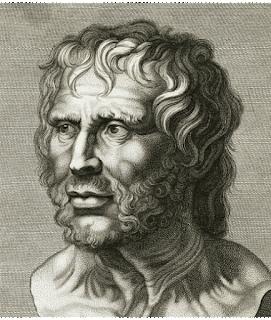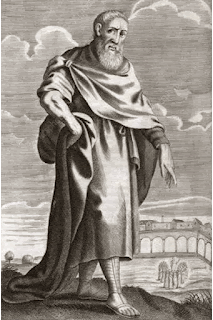Discover the top 5 most influential stoic philosophers of all time and learn about their teachings and philosophies in this informative article.
The Top 5 Stoic Philosophers You Need to Know About
Introduction to Stoicism and its Core Principles
Stoicism and its key principles.
Here are the 5 most famous stoic philosophers
Zeno of Citium: The Founder of Stoicism.
 |
Chrysippus writings
Chrysippus ( 280-207 B.C.), who succeeded Cleanthes, was a voluminous author, and is said to have written seven hundred and five books.
Chrysippus philosophy
He made Stoicism systematic and pedantic. He held that only Zeus, the Supreme Fire, is immortal; the other gods, including the sun and moon, are born and die. He is said to have considered that God has no share in the causation of evil, but it is not clear how he reconciled this with determinism. Elsewhere he deals with evil after the manner of Heraclitus , maintaining that opposites imply one another, and good without evil is logically impossible: "There can be nothing more inept than the people who suppose that good could have existed without the existence of evil. Good and evil being antithetical, both must needs subsist in opposition." In support of this doctrine he appeals to Plato, not to Heraclitus.
Chrysippus maintained that the good man is always happy and the bad man unhappy, and that the good man's happiness differs in no way from God's. On the question whether the soul survives death, there were conflicting opinions. Cleanthes maintained that all souls survive until the next universal conflagration (when everything is absorbed into God); but Chrysippus maintained that this is only true of the souls of the wise. He was less exclusively ethical in his interests than the later Stoics; in fact, he made logic fundamental.
Chryippus' logic
The hypothetical and disjunctive syllogism, as well as the word "disjunction," are due to the Stoics; so is the study of grammar and the invention of "cases" in declension. Chrysippus, or other Stoics inspired by his work, had an elaborate theory of knowledge, in the main empirical and based on perception, though they allowed certain ideas and principles, which were held to be established by consensus gentium, the agreement of mankind. But Zeno, as well as the Roman Stoics, regarded all theoretical studies as subordinate to ethics: he says that philosophy is like an orchard, in which logic is the walls, physics the trees, and ethics the fruit; or like an egg, in which logic is the shell, physics the white, and ethics the yolk. Chrysippus, it would seem, allowed more independent value to theoretical studies. Perhaps his influence accounts for the fact that among the Stoics there were many men who made advances in mathematics and other sciences.
Stoicism, after Chrysippus, was considerably modified by two important men, Panaetius and Posidonius. Panaetius introduced a considerable element of Platonism, and abandoned materialism. He was a friend of the younger Scipio, and had an influence on Cicero, through whom, mainly, Stoicism became known to the Romans. Posidonius, under whom Cicero studied in Rhodes, influenced him even more. Posidonius was taught by Panaetius, who died about 110 B.C.
 |
Who is Posidonius
Posidonius histories
This affinity to Plato is shown in his teaching about the soul and the life after death. Panaetius had said, as most Stoics did, that the soul perishes with the body. Posidonius, on the contrary, says that it continues to live in the air, where, in most cases, it remains unchanged until the next world-conflagration. There is no hell, but the wicked, after death, are not so fortunate as the good, for sin makes the vapours of the soul muddy, and prevents it from rising as far as the good soul rises. The very wicked stay near the earth and are reincarnated; the truly virtuous rise to the stellar sphere and spend their time watching the stars go round. They can help other souls; this explains (he thinks) the truth of astrology. Bevan suggests that, by this revival of Orphic notions and incorporation of Neo-Pythagorean beliefs, Posidonius may have paved the way for Gnosticism. He adds, very truly, that what was fatal to such philosophies as his was not Christianity but the Copernican theory. Cleanthes was right in regarding Aristarchus of Samos as a dangerous enemy.
 |
Seneca: The Philosopher of Practical Wisdom.
Seneca and Nero relationship
What did Seneca write
Seneca’s works included essays, moral letters, dialogues and tragedies, almost all published in his lifetime, and they had a wide readership and great popularity.
Seneca philosophy
He knew the thought of his Stoic predecessors well, and applied it eclectically to the business of living a good, fortitudinous and reason-governed life. ‘No doubt troubles will come; but they are not a present fact, and might not even happen after all – why run to meet them? … More things make us afraid than do us harm … Do not be unhappy before the crisis comes … Some things torment us more than they ought, some torment us before they even happen; some torment us which should not torment us at all. We exaggerate, or imagine, or anticipate sorrow, unnecessarily.’ The theme is the central Stoic one that it is our own attitudes and beliefs that make life good or bad. Hamlet was epitomizing Stoicism in his remark that ‘there is nothing either good or bad, but thinking makes it so.’
There is nothing theoretical about the adjurations of the Stoics, for whom philosophy was a practical matter, aimed at making a real difference to the felt quality of life. Understanding oneself and how things are in the world is liberating, they argued, precisely because it puts the key to happiness into our own hands: we can choose to be indifferent to what we cannot influence, while at the same time rationally governing our own feelings. It was a commentator on Stoicism, Cicero, who best found a way of summing up their ethical outlook: ‘to learn to philosophize’, he wrote, ‘is to learn how to die,’ meaning that a right understanding of death frees one from the fear of it, so that one can live with greater courage and autonomy. If you are not afraid of death you are ultimately and completely free, because you always have an escape from the intolerable. Freedom from the oppression of anxiety and fear, and from desiring what one cannot oneself achieve or gain, is happiness itself.
 |
Epictetus: The Philosopher of Inner Freedom.
Self-knowledge and self-mastery are the key ideas in Epictetus. He argued that the distinction between what is within our power and what lies outside our power shows where the good is to be found, namely, within ourselves. Our use of reason, and our freedom to choose, allow us to evaluate the experiences we have and to ask ourselves, ‘Can I do something about this?’ If the answer is Yes, then act; if the answer is No, then say, ‘It is nothing to me’; this is the apatheia connoted in the idea of bearing with (‘being stoical about’) the unavoidable or inevitable. Everything turns on our attitudes, which lie under our own control, guided by reason. Acceptance of inevitabilities is freedom; it is ‘the price paid for a quiet mind’.
There is something of fatalism in Epictetus’ teaching. ‘Ask not that events should happen as you will, but let your will be that events should happen as they do, and you shall be at peace. Behave in life as you would at a banquet. A dish is handed round and comes to you; put out your hand and take politely. It passes you; do not stop it. It has not reached you; do not be impatient to get it, but wait until your turn comes . Remember that foul words and blows are no outrage in themselves; it is your judgment that they are so that makes them so. When anyone makes you angry, it is your own thought that has angered you. Therefore make sure not to let your impressions carry you away.’


Comments
Post a Comment